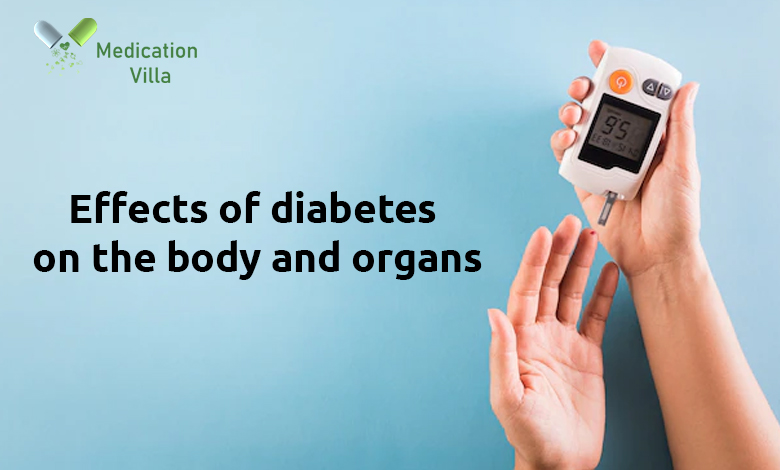Effects of diabetes on the body and organs

Early diagnosis and a plan of treatment that includes regular medical care, lifestyle modifications, medication, and monitoring can help to limit the negative effects of diabetes.
This article examines some long-term complications associated with diabetes and suggests ways to avoid them. Do not use Tadalista 20 when you have this problem.
Learn how to recognize common signs and symptoms of diabetes.
Diabetes types
The main source of energy for the human body is glucose, also known as blood sugar. Insulin is a hormone that helps cells convert glucose into fuel.
Type 1 diabetes is caused by the body’s immune system attacking cells in the pancreas, which stops them making insulin. Type 2 diabetes is when the body can’t make insulin or it doesn’t work as well.
Both types of diabetes can cause blood sugar levels to rise above the recommended level
Type 2 is more common. Type 2 is more common. It can develop over time. Type 1 is most commonly found in children and teens. However, it can also develop at any age.
Both types can cause severe complications to the body.
Cardiovascular and circulatory systems
High blood glucose levels can damage all parts of your cardiovascular system. Diabetes and cardiovascular problems are closely linked.
Blood vessels
Blood sugar levels that are too high can cause blood vessels to contract and narrow which in turn reduces their elasticity, causing blood flow to be impeded. This can cause a decrease in blood supply and oxygen which can increase the risk of high blood pressure. It can also lead to damage to small and large blood vessels.
Nearly 74% of people with diabetes are hypertensive, according to a trusted source.
Large blood vessels can be damaged by macrovascular disease. Small blood vessels can also be damaged by microvascular disease.
Macrovascular Disease:
- heart attack
- stroke
- peripheral arterial disease
A microvascular disease can also cause problems with:
- eyes
- kidneys
- nervous system
Diabetes can be reduced by
- managing blood sugar levels
- Quitting Smoking
- managing blood pressure
- Using prescription medication, such as statin drugs to lower cholesterol
- monitoring blood pressure
- exercising regularly
- eating a fiber-rich diet
Some people with type 2 diabetes may need to be prescribed sodium-glucose-cotransporter 2 inhibitors (SGLT2) or glucagon-like progesterone 1 receptor agonists(GLP-1 RA).
These drugs can lower the risk of cardiovascular disease and high blood sugar. These drugs can also use to lower weight, lower blood pressure and reduce inflammation. They also improve cardiac function.
These guidelines are for people with diabetes and those with atherosclerotic heart disease, high-risk of developing cardiovascular disease, or chronic kidney disease.
These drugs may also help to reduce the likelihood of developing chronic kidney disease. They may prescribe by a doctor to treat atherosclerosis, but not heart failure.
The cardiovascular system
According the Centers for Disease Control and Prevention, cardiovascular disease is the leading cause of early death in people with diabetes.
According to the CDC, people with diabetes are twice as likely to suffer a stroke or die from a heart disease than those who don’t have diabetes.
People suffering from diabetes are more likely to have serious heart problems than those without it.
Additionally, diabetes is often associated with other conditions that can stress the heart such as hypertension, obesity, high cholesterol, and hypertension.
Poor diet and inactivity are risk factors for diabetes and cardiovascular disease.
Infections and Wounds
Poor circulation can affect Trusted Source your body’s ability heal from wounds or infections. Low blood supply, oxygen, and nutrients are the main causes.
Anyone with diabetes should regularly check their skin for any wounds. If they do, it is important to see a doctor.
The nervous systems
Neuropathy, also known as nerve damage, can be a common side effect of diabetes. Nerve damage is a common complication of diabetes. It affects between 10-20% of those who have diagnosed. A person with diabetes will have a higher chance of developing neuropathy if they live longer.
Nearly half of those with diabetes will develop the condition.
Neuropathy affects any part of the nervous systems, including those that control involuntary or autonomic functions such as digestion.
The most common type is peripheral neuropathy. This can cause pain and numbness in your extremities, namely your legs, feet, toes, arms ,and hands.
Neuropathy may also affect the hips, upper legs ,and spine.
According to the National Institute of Diabetes and Digestive and Kidney Diseases, more than half of diabetics have peripheral neuropathy and 30% have autonomic and neuropathy.
To learn more about diabetic neuropathy, click here.
Feet
Neuropathy can cause a loss of sensation, making it difficult for people to spot small wounds. This can cause severe complications when combined with poor circulation.
A blister can quickly develop if a person doesn’t notice it. This is due to poor circulation. Sometimes, tissue death and ulceration can occur.
The kidneys, urinary system ,and bladder
High blood sugar levels can cause damage to the blood vessels and kidneys. This can cause kidney damage that prevents the kidneys removing waste from the blood. If left untreated, kidney disease can develop.
Diabetes is one of the leading causes of kidney disease according to the NIDDK. It is a leading cause of kidney disease in 1 out 3 people. Trusted Source: Diabetes.
Vision
Diabetes can increase the Trusted Source risk of several eye conditions, including vision loss.
Blurred vision from high blood sugar can cause blurred vision. Long-term complications include:
- glaucoma
- diabetic retinopathy
- macular edema
- cataracts
Regular eye exams, controlling blood sugar and quitting smoking are all ways to protect your eyes from diabetes.
Digestive system
The nervous system can damage and affect the autonomic body functions including digestion.
Gastroparesis is a condition in which nerve damage can interfere with Trusted Source the digestive system’s ability to move food from the stomach to the small intestine.
A condition could result in:
- nausea
- vomiting
- acid reflux
- bloating
- abdominal pain
- weight loss in severe cases
Sexual Health and Fertility
Diabetes-related blood vessel and autonomic nervous system damage may have a negative impact on sexual function, and the body’s response to sexual stimuli.
It is more common for men with diabetes to experience erectile dysfunction than it is for those without the condition. Trusted Sources can see it 10-15 years earlier than people who have not diagnosed. Tadalista 60 cannot be taken when you have this problem.
There are other ways that diabetes can impact people’s sexual confidence.
- The condition’s effect on mental health
- Concerns that sex could lower glucose levels and lead to hypoglycemia
- Uncertainty about how to use an insulin pump
There are solutions to all these problems.




